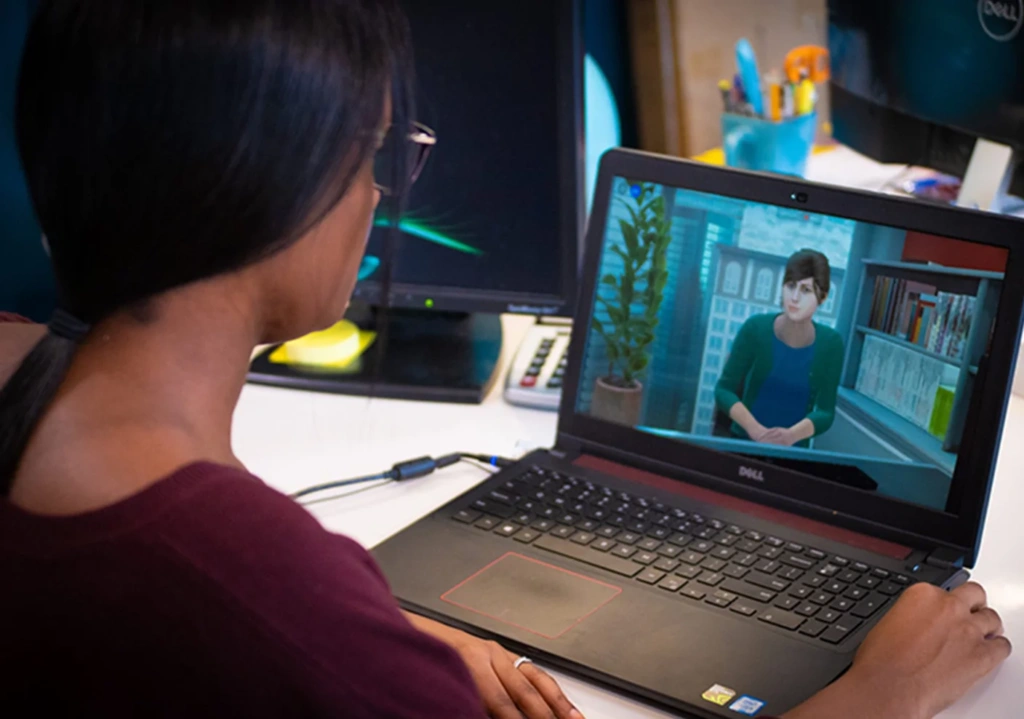Typically, we use this space to bring you excerpts from our Future of Work Roundtable series. But with futurists feverishly posting their forecasts for 2023, we thought we’d turn to our own leader, CEO, and founder Mark Atkinson, for his take on work trends around the bend.
This year has unleashed work-trend predictions from forecasters at Forbes, Fast Company, and Gartner. Interestingly, all of them concur that a top trend in 2023 will be addressing the soft-skills gap. “Human skills are the new hard skills,” says Forbes, citing “cultural and social intelligence” as one of the newest ones. Why does the future of work depend on their development?
The excitement and fear surrounding the potential of generative AI to transform the workplace is the latest reminder that the technical skills required for work will be forever changing, while the human skills required for success will endure. Ever since Peter Drucker coined the phrase, “Culture eats strategy for breakfast,” management experts have understood the importance of human skills. As the baby boom generation retires and the most talented members of Generation Z have the freedom to shop for working environments that have cultures consistent with their values, leaders who want to attract the stars of this generation must inculcate their organizations with a sense of purpose and belonging.
Talent is moving from organization to organization faster than ever before. Even within organizations, talent marketplaces are emerging where individuals assemble into discrete cross-functional teams to solve key business tasks. “Your” team today will likely be someone else’s tomorrow. As leaders, we have precious little time to build relationships with team members and organize processes by which our teams collaborate effectively with one another.
Cultural intelligence is vital to effective leadership. Leaders need to develop trusting relationships with key colleagues across the organization, not just their direct reports, but with peers and supervisors. A typical people leader will likely be responsible for multinational team members. The team will likely span four generations of work experience. It will inevitably be diverse with an ever-greater range of ethnic, cultural, and gender identities represented. English may be one of many languages spoken by most team members. Some will work on-premises; others will be remote. Leaders must know how to build trusting relationships across the team, how to coach and mentor those who need extra support, how to instill a sense of collaborative problem solving across the team, and how to communicate effectively. Above all, they must instill in their teams a sense of belonging such that every team member is motivated to fully contribute to the organization. Research confirms that the best ideas emerge from diverse and inclusive teams. Cultural intelligence and empathetic leadership accelerate the connections that lead to innovation.
Why do leaders today lack these relationship-building skills?
Rigid hierarchical norms destroy trust. Hierarchy distances the executive team from the people they most need to understand – customers, suppliers, and employees. At many large organizations, leaders have traveled so far from the heart of the business that they no longer know how to improve their service or build the next product. Tone-deaf to the voices below them, these leaders make decisions in echo chambers of like-minded colleagues. Bad decisions typically are one of the many bad outcomes from “groupthink.”
Organizations can’t afford the distance that hierarchy imposes. Leaders need to keep channels open to all layers of the organization to provide for multiple lines of input into decisions they are making. They must pay particular attention to contrarian perspectives. In today’s hypercompetitive environment, the competitors who listen are the ones who win.
Much has been written about the importance of empathy. What’s your take on that? Can empathy be taught?
Perfect empathy is aspirational. None of us can completely understand what it means to fully experience life as another person. However, there are many skills and competencies associated with empathy that are teachable and can be mastered. One can be taught how to develop trusting relationships with colleagues at work. One can be taught active listening skills and how to facilitate team meetings that give every member an equal chance to voice an opinion and promote a sense of inclusion and belonging. Leaders can be taught how to coach and mentor less experienced colleagues and how to communicate effectively across the organization. These skills, when mastered, enable leaders to project to their colleagues an authentic empathetic self.
Mursion simulations open the door to greater understanding by giving learners the opportunity to practice these skills and receive data and contextual coaching to further develop their sense of empathy and their leadership competencies at work. Leaders who effectively build trusting relationships with colleagues are more likely to attract and retain top talent. When teams trust one another, they contribute their best ideas without fear. Fearless transparency is necessary for agile decision-making and innovation.
Mursion simulations also enable leaders to develop the skills that make others feel heard, valued, and self-actualized. This creates a culture of inclusion and belonging which allows companies to stay close to their customers and receptive to change.
If human skills are so important to develop, why are we turning to technology to develop them?
Technology creates the “situational plausibility” for the challenging conversations that learners practice in Mursion. But human experts are the heart and soul of the simulation experience. Humans interpret the spoken dialogue in our simulations and humans provide the spoken responses. Artificial intelligence algorithms enable Mursion’s human Simulation Specialists to be transmogrified into multiple digital avatars at one time. Mursion uses digital avatars because extensive psychology research has confirmed that humans do not feel “judged” by digital characters. The unique combination of human intelligence and artificial intelligence that the learner experiences in a Mursion simulation creates a level of challenge that requires learners to tap every skill in their repertoire in order to achieve the goals of the scenario. Often, learners are forced to confront the limitations of their expertise. Mistakes are common; so are “do-overs.” Learners can pause and restart a simulation to try a different strategy. In this sense, Mursion creates the ideal context for virtual coaching. Mursion’s Simulation Specialists see learners struggle and make mistakes in the moment. The coaching and analysis Mursion provides post-simulation are powerful and accelerate learning. Numerous research studies have shown that after three or four simulation sessions, learners start to change their behavior.
If you’ve participated in role play, you’ll appreciate why Mursion simulations are so much more effective. Simulations feel realistic. They test your skills. Learners experience the stress of potentially failing or simply being unable to accomplish the goals of the conversation. It’s exactly like that feeling you have when you lose control of a meeting at work. One can’t possibly replicate that level of stress or vulnerability in a traditional role play. As a learner, your primary goal in such moments is to avoid embarrassment – to not let your guard down, or to avoid the risk of humiliating one of your work colleagues by causing them to fail in public. Role plays quickly devolve into charades.
Why are avatar-based simulations the future of human-skills development?
A decade ago, if you wanted to improve your interpersonal skills, you’d ask colleagues to give you feedback on how you come across in meetings. If you were exceptionally ambitious, you might go so far as to videotape or audiotape some of your team meetings and “score” your performance using a leadership rubric. Alternatively, you might have searched for videos on the internet that show exceptional leaders in action. These internet videos, if you can find them, would most likely be of actors reenacting scripts of what great leaders might do in a specific context. It’s unlikely that you would find authentic videos of great leaders handling actual challenging conversations on the job. Lastly, and most likely, you can read about these leadership skills. As we all know, there’s a significant difference between reading how to do something and doing it well.
We know that you don’t play cello like Yo-Yo Ma just by watching a video or reading about his technique. To acquire professional skills, one needs to try out different approaches, repeatedly. Athletes call this muscle memory. Well, there’s muscle memory to human skills too. It takes repeated practice. But the research is clear: With repeated practice behavior will change.
That’s why simulations are going to be the preferred modality for mastering human skills for the indefinite future. Think what flight simulators did for aviation: Pilots learned to solve mid-air crises by practicing different approaches under extreme emotional stress. Pilots can “crash” the simulator repeatedly without endangering lives, until they reach a level of professional proficiency by which they know they’ll never make the same mistake in a real plane. Similarly, avatar-based simulations give leaders the opportunity to practice high-stakes interactions in emotionally charged situations without incurring the risk of doing harm to customers or colleagues.
How is Mursion shaping the future of work?
In bringing humans, AI, and avatars together, Mursion is helping leaders learn how to “give voice” to the vast majority of employees who feel “unheard” at work. When the unheard feel listened to, productivity, adaptability, and innovation take off.


